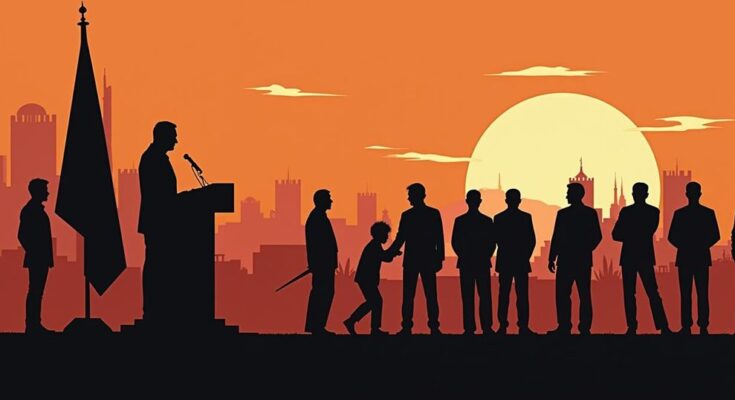At the UN General Assembly, Israeli Prime Minister Benjamin Netanyahu presented a defining choice between peace and Iranian aggression, defended Israel’s military efforts in Gaza against claims of civilian casualties, and called for international action against Iranian influence. His remarks followed strong criticism from Palestinian President Mahmoud Abbas, who accused Israel of genocide and sought a cease-fire and recognition. The speeches highlighted the deep-rooted tensions and differing narratives in the Israeli-Palestinian conflict, amidst calls for global intervention.
During the 79th UN General Assembly in New York City, Israeli Prime Minister Benjamin Netanyahu articulated a stark choice facing the international community: the potential for a “blessing” in the form of peace in the Middle East or the imminent threat of a “curse” represented by increased Iranian aggression and regional instability. He illustrated his points with contrasting maps that depicted his vision for a peaceful future linking Asia to Europe and an ominous portrayal of an expanding “arc of terror” led by Iran. Netanyahu emphasized Israel’s commitment to peace, declaring, “Israel seeks peace. Israel yearns for peace. Israel has made peace and will make peace again.” He delivered his remarks in response to recent criticisms aimed at Israel, particularly targeting statements made by Palestinian President Mahmoud Abbas, who had previously referred to Israel’s actions in Gaza as genocide and called for an immediate cease-fire. Abbas asserted that significant casualties, including thousands of children, have resulted from conflicts instigated by Israel. In addressing the assembly, Netanyahu defended Israel’s military operations in Gaza, asserting that the Israel Defense Forces (IDF) have made considerable efforts to minimize civilian casualties, including deploying warning flyers and sending mass text messages prior to strikes. He confronted allegations of intentional targeting of civilians, stating, “We see this moral confusion when Israel is falsely accused of deliberately targeting civilians.” Netanyahu also depicted Hamas as “savage enemies” manipulated by Iran, detailing the ongoing violence and Israel’s successful military campaign against Hamas that has reportedly destroyed a significant portion of its military capabilities. He warned of Iran’s influence in the region, stating, “If you strike us, we will strike you,” thereby emphasizing the reach of Israeli defense capabilities. Notably absent from the assembly were delegates from Iran and Palestine, with both leaders facing considerable backlash regarding their speeches. Netanyahu concluded by urging global leaders to unite against Iran’s nuclear aspirations and called for the reinstatement of sanctions, portraying the current conflict as a fight for stability not only for Israel but for the entire international community. The session was interspersed with contentious exchanges, as Abbas put forth his vision for peace, advocating for a complete cease-fire, withdrawal of Israeli forces from Gaza, and immediate humanitarian aid, while also calling for recognition of Palestinian statehood in the UN. In a robust response, he criticized the U.S. for vetoing motions in favor of Palestine, claiming a duality of oppression against his people. Ultimately, both leaders’ remarks reflect a deepening schism in perspectives on the Israel-Palestine conflict, making the prospect of peace seem increasingly tenuous as each side underscores its grievances and narratives in the face of international scrutiny.
The context of this discourse at the UN assembly revolves around the ongoing and escalating conflict between Israel and Hamas, which has resulted in substantial loss of life and widespread destruction in Gaza. Following Hamas’s attack on October 7, 2022, the IDF has been engaged in extensive military operations aimed at dismantling Hamas’s operational capabilities. Simultaneously, the Palestinian leadership, under Mahmoud Abbas, seeks international intervention and recognition of Palestinian statehood amidst accusations of Israeli war crimes. This assembly serves as a critical platform for both leaders to present their narratives to the global community, underscoring the contested political terrain of the Middle East.
In summary, Israeli Prime Minister Benjamin Netanyahu’s address at the UN General Assembly highlighted the dichotomy between potential peace and rising regional threats, underscored by Iran’s involvement. He defended Israel’s military strategies in the conflict with Hamas while condemning the narrative of civilian targeting. Palestinian President Mahmoud Abbas countered with a plea for international support against Israeli actions, reinforcing the enduring complexities in the Israeli-Palestinian conflict. As both countries present their respective visions for the future, the path toward peace remains fraught with challenges and diverging perspectives.
Original Source: www.upi.com




